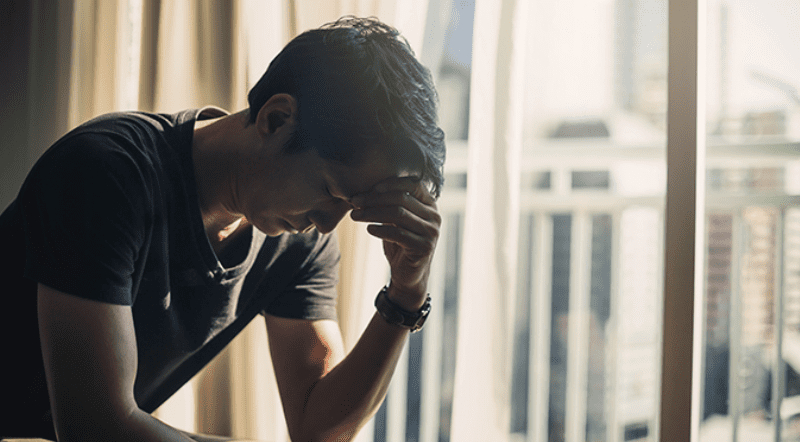Anxiety and Addiction Treatment in Maryland
Feeling anxious about current or upcoming events in life is perfectly normal. But some people find themselves experiencing feelings of anxiety in settings where that should not be happening. Or they may experience feelings of anxiety for long periods of time.
The inability to control anxiety whatsoever might be a sign that something is wrong and that this is not a common case of nerves.
According to the Anxiety and Depression Association of America (ADAA), anxiety disorders are the most common mental illnesses in the United States.
Approximately 40 million adults are affected by anxiety disorders every year. However, only about 36.9% of those living with an anxiety disorder receive treatment for their mental health disorders. Luckily, The Freedom Center is here to treat anxiety and help those who suffer from this dual diagnosis.
People Become Dependent on Their Medication
Attempting to Self-Medicate
Substance Abuse Leads to the Mental Illness
An Interconnected Cycle
Whatever the cause may be, having a dual diagnosis of anxiety and addiction can be incredibly difficult and harmful. A person’s daily life can be forever changed when drug or alcohol abuse is combined with an anxiety disorder. Fortunately, however, there is hope for those struggling with co-occurring anxiety and addiction. A professional dual diagnosis program can help.
What are the Signs and Symptoms of Anxiety Disorders and Addiction?
Anxiety disorders can happen to anyone, at different ages, and can come in many different diagnoses. While the intensity and kinds of physical symptoms experienced may change from person to person, the most common ones are:
- Nervousness and tension
- Feelings of imminent danger, panic, or doom without there necessarily being any threats
- Increased heart rate and respiration (hyperventilation)
- Shaking, trembling, or chills
- Financial challenges develop as the individual is spending more and more money on the substance
- Legal issues from getting into legal trouble, such as arrests for driving under the influence, or stealing to support a drug habit.
- Neglecting responsibilities to avoid anxiety and/or engaging in substance use
- Weakness or tiredness
- Problems with concentration and/or only thinking about what’s causing worries
- Changes in eating and sleeping habits (either too much or too little)
- Experiencing gastrointestinal problems
- Unusual changes in mood (irritability, moodiness, etc)
- Feeling the need to avoid things, people, or places that might trigger anxiety
- Experiencing withdrawal symptoms when trying to quit the substance
- Develop a tolerance for needing more of the substance to achieve the same effect.
What is most important to understand is that suffering from an anxiety disorder is not just feeling anxious. Instead, it means that the person is not able to truly calm down or turn down their brain. Often, the disorder triggers levels of anxiety that are not “reasonable” to the situation. Individuals with anxiety may use drugs or alcohol to temporarily relieve their symptoms. Over time, this can lead to dependency as the person continues to use the substance to control their anxiety.
It is important to be aware of all the symptoms of anxiety and substance abuse because individuals who suffer from this co-occurring disorder often go untreated for one or even both disorders.
Types of Anxiety Disorders
While we often talk about anxiety on its own, it is important to understand that there are multiple disorders that fall under the anxiety disorder category. Research has shown that different types of anxiety disorders have varying degrees of correlation with substance abuse. Here are some insights:

Generalized Anxiety Disorder (GAD)
According to the National Institute of Mental Health (NIMH), generalized anxiety disorder (GAD) is characterized by a “persistent feeling of anxiety or dread”. This mental health disorder often causes people to have difficulty concentrating. Individuals with generalized anxiety disorder may become fatigued easily and have trouble controlling their feelings of anxiety. They may have headaches, stomach aches, or other unexplained pains. Sleeping problems and restlessness are also common symptoms of generalized anxiety disorder.
The Anxiety and Depression Association of America (ADAA) states that GAD impacts 6.8 million adults in the United States. Also, generalized anxiety disorder often co-occurs with major depression. Studies have indicated a high prevalence of substance use disorders among individuals with GAD, with alcohol being the most commonly abused substance.
Panic Disorder
According to the ADAA, panic disorders affect 6 million adults in the United States and women are more likely to experience it than men. Research suggests that people with panic disorder are more likely to struggle with substance abuse, potentially as a way to cope with the distressing symptoms of their anxiety.
Social Anxiety Disorder
Symptoms of this disorder might include extreme self-consciousness, sweating, trembling, racing heart, and stomachaches. People with this disorder may also have trouble making eye contact with others and may use an incredibly soft voice when they speak in social settings.
The ADAA states that social anxiety disorder affects 15 million adults in the United States. Additionally, studies have found that individuals with SAD are at high risk for developing alcohol use disorders, possibly due to using alcohol as a coping mechanism to reduce social inhibitions and fears.
Phobia-Related Disorders
The Anxiety and Depression Association states that symptoms of phobia-related disorders typically first show in childhood. Women are more likely to have phobias than men. Approximately 19.3 million adults in the U.S. have specific phobias.
Obsessive-Compulsive Disorder (OCD)
On the other hand, substance use can also lead to the development or worsening of OCD symptoms. Certain substances, especially stimulants, can increase anxiety and trigger obsessive thoughts and compulsive behaviors.
Post-Traumatic Stress Disorder
Conversely, substance use can exacerbate symptoms of PTSD. For example, alcohol and drugs can disrupt sleep patterns and increase the risk of nightmares and flashbacks. Substance use can also lower inhibitions, making it more likely for someone to put themselves in dangerous situations, potentially leading to re-traumatization.
Treatment For Anxiety and Addiction
People who need mental health and substance abuse treatment can receive the help they need at a dual diagnosis treatment center. It is necessary to treat both the addiction and the mental disorders simultaneously, rather than focusing solely on one issue. This allows individuals to overcome addiction while also learning to manage the symptoms of their psychiatric disorders.
During the dual diagnosis treatment process, individuals can receive a full continuum of care, including detox, residential care, outpatient treatment, and aftercare treatment. Some of these comprehensive programs are offered right here at The Freedom Center, our state-of-the-art mental health and substance abuse treatment center in Maryland.
Our Maryland Dual Diagnosis Programs for Anxiety and Addiction
If you are suffering from anxiety and addiction, we can help! We will address your individual and unique needs throughout the treatment process, as we know there is no one-size-fits-all approach to anxiety and addiction treatment. Our programs include residential/inpatient treatment, outpatient treatment, and therapeutic interventions.
Residential/Inpatient Treatment Program
Residential treatment is a highly structured, individualized treatment type that is best suited for individuals who are suffering from severe addiction or co-occurring disorders. For those who are living with co-occurring mental health conditions and drug addiction, residential or inpatient treatment can make all the difference in whether someone stays in recovery after treatment is over.
Outpatient Treatment Program
We offer general outpatient care, an intensive outpatient program, and a partial hospitalization program. Each of these rehab programs can be effective for those who are transitioning from inpatient care into life outside of treatment.
Therapeutic Interventions for Mental Health and Substance Abuse
Medication
There are several types of medications that can be used to treat anxiety and substance use disorders. However, it’s crucial to remember that medication should be used as part of a comprehensive treatment plan that often includes psychotherapy, lifestyle changes, and other interventions.
Medications for Anxiety Disorders
Selective Serotonin Reuptake Inhibitors (SSRIs): These include drugs like fluoxetine (Prozac), sertraline (Zoloft), and paroxetine (Paxil). SSRIs work by increasing the level of serotonin, a neurotransmitter in the brain that helps regulate mood.
Serotonin and Norepinephrine Reuptake Inhibitors (SNRIs): Examples include venlafaxine (Effexor) and duloxetine (Cymbalta). SNRIs increase the levels of serotonin and norepinephrine in the brain.
Benzodiazepines: These are used primarily for short-term relief of acute symptoms, as they have the potential for dependence and withdrawal over the long term. They include drugs like alprazolam (Xanax) and lorazepam (Ativan).
Buspirone: This is used to treat chronic anxiety and works by affecting the chemicals in the brain that regulate mood.
Medications for Substance Use Disorder
Naltrexone: Used to treat opioid and alcohol dependency by blocking the euphoric effects and feelings of using either substance, allowing the person to avoid the feeling “high”.
Methadone: This is a long-acting opioid used when someone develops dependence. It helps to normalize the body’s neurological system and reduce withdrawal symptoms.
Buprenorphine: Also used for opioid dependence, it can decrease withdrawal effects and cravings.
Disulfiram (Antabuse): Used for treating chronic alcohol addiction. It produces unpleasant side effects like nausea and flushing of the skin when alcohol is consumed.
Acamprosate (Campral): It can help individuals suffering from alcoholism maintain abstinence by restoring the balance of certain chemicals in the brain.
Nicotine Replacement Therapies: These include patches, gums, lozenges, nasal sprays, and inhalers and are used to manage nicotine withdrawal symptoms and cravings.
Each of these medications has its own benefits and risks, and not all will be suitable for every individual. Treatment decisions should always be made in consultation with a medical professional who specializes in mental health and addiction treatment. Specifically, someone who can take into account the individual’s specific needs, health status, and other factors.
Therapy
The main types of therapy found in most rehab programs include the following:
- Group therapy
- Family therapy
- Individual therapy
- Cognitive behavioral therapy
- Dialectical behavior therapy
- Exposure therapy
Counseling and therapy can help people develop the routines and coping skills they need in order to avoid relapse. Also, therapy raises awareness of the negative consequences of addiction and promotes positive outcomes in recovery. This helps people stay focused on their treatment and continue to thrive in recovery!
During therapy, those who are working on overcoming anxiety and addiction can learn more about their thought processes, emotions, harmful coping methods, and more. This then allows them to develop a healthier mindset.
In group therapy, recovering individuals can learn more about the experiences of others. Group therapy also facilitates the development of peer relationships among recovering individuals.
Lifestyle Changes
In addition to medication and ongoing therapy, it’s important that individuals make the correct lifestyle changes in order to support their recovery efforts and avoid relapse. Lifestyle changes require keeping up a pattern or productive and healthy behaviors. The importance of each is learned during your treatment. Once you’re living on your own, it will be your responsible to keep up with these. Lifestyle changes can include the following:
- Set sleep patterns or behaviors
- A strict but healthy diet of foods and vitamin supplements
- Regular exercise schedule
- Scheduled times for meditation and/or self-care
- Journaling regularly to monitor moods, feelings, etc
Get Help Right Now at The Freedom Center
No matter what disorder you might be struggling with or how many, treatment is a possibility. If you are looking for treatment for yourself or a loved one, we at The Freedom Center can help. We offer multiple options that can include a dual diagnosis plan. Our medical team will make an assessment in order to design the perfect treatment plan for your needs.
We believe in using every tool possible to help you become addiction-free. Visit our website to learn more about our center, contact us today. We can discuss all of your questions and concerns so you can be sure you are making the best choice for yourself and for your treatment.






























